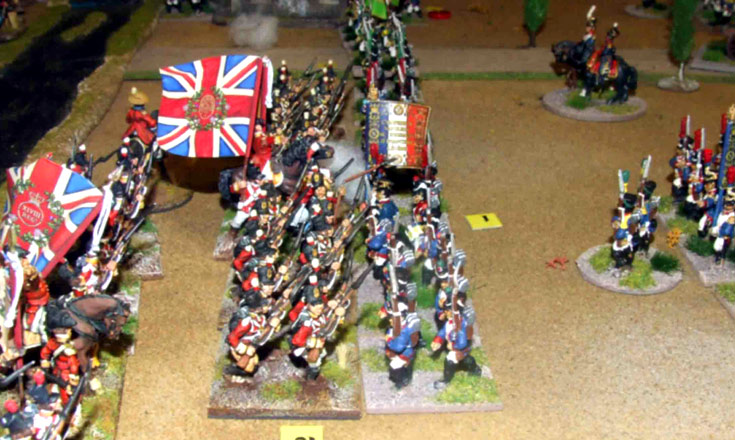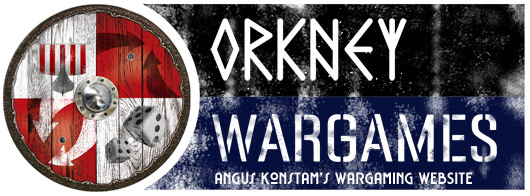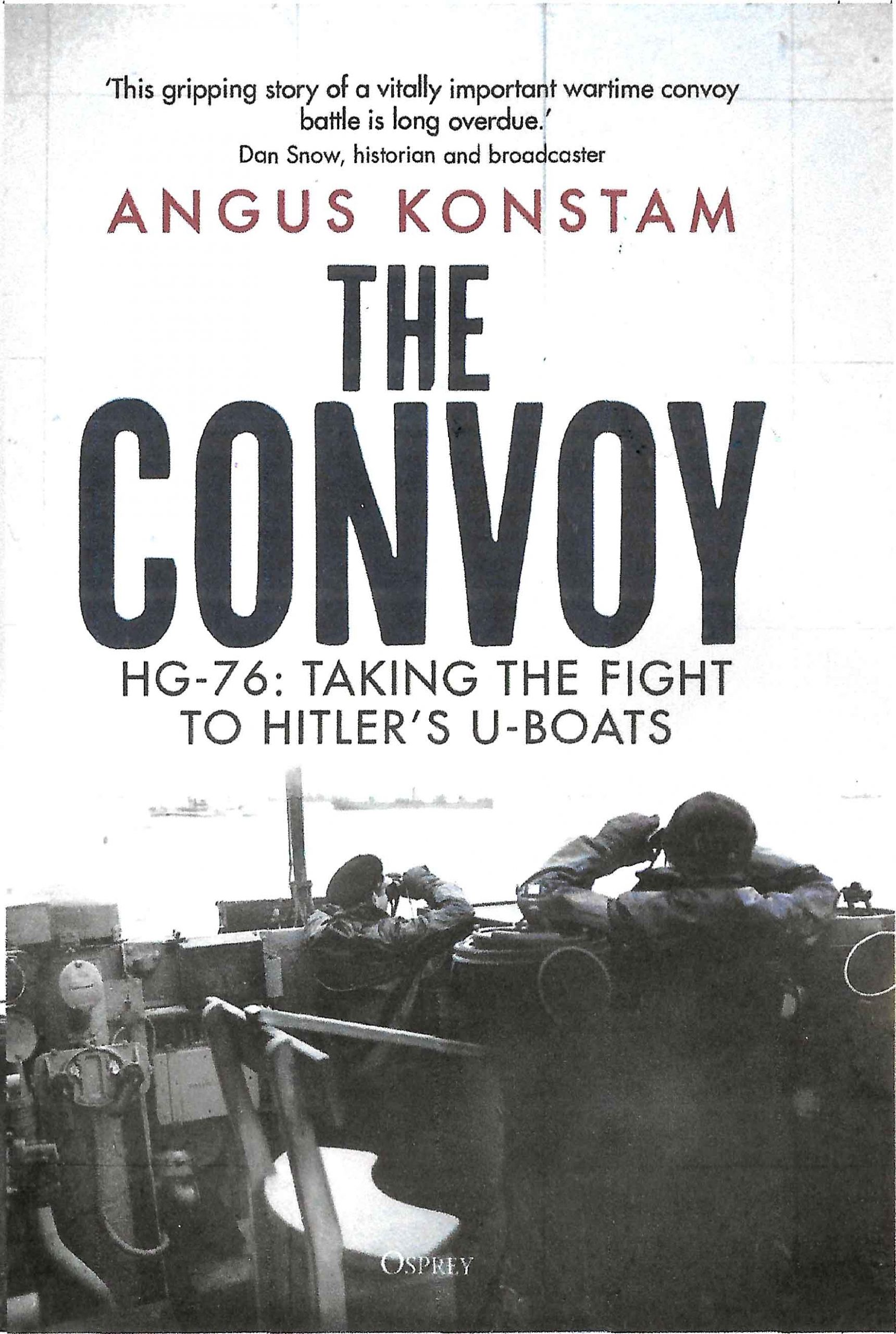
Battle of Redinha, 1811
24th September 2012, 0 Comments
The Napoleonic Wars, Black Powder, 28mm
This game organised by Bill Gilchrist was very loosely based on the rearguard action at Redinha on the River Soure, during the French retreat from Portugal in 1811. The real battle was something of a triumph for Ney, who was the man on the spot. He held off Wellington’s British for a day, and only fell back as darkness fell. Would history repeat itself? For this battle we used my British, while Bill supplied the French. Apologies for the awful pictures by the way.  The French had nine infantry battalions at their disposal, in three brigades, supported by a brigade of light cavalry and a couple of gun batteries. Despite having to launch a frontal attack the Anglo-Portuguese army had a near identical size of force – except the Portuguese brigade had four battalions in it instead of three. The French were lined up behind the river, and were using a built-up area representing the village of Redinha as the central anchor of their line. Now, winkling troops out of buildings is a tough proposition in Black Powder, so my fellow commanders Bart and Campbell decided to screen the village, and launch attacks on either side of it. Meanwhile my own brigade on the right would also cross the shallow river, supported by the British light cavalry.
The French had nine infantry battalions at their disposal, in three brigades, supported by a brigade of light cavalry and a couple of gun batteries. Despite having to launch a frontal attack the Anglo-Portuguese army had a near identical size of force – except the Portuguese brigade had four battalions in it instead of three. The French were lined up behind the river, and were using a built-up area representing the village of Redinha as the central anchor of their line. Now, winkling troops out of buildings is a tough proposition in Black Powder, so my fellow commanders Bart and Campbell decided to screen the village, and launch attacks on either side of it. Meanwhile my own brigade on the right would also cross the shallow river, supported by the British light cavalry. Things started to unravel pretty quickly. Bart had command of the guns, but lost one through counter-battery fire almost as soon as it unlimbered. This would make it tough taking the village when the time came, as you really need to soften it up first. Revenge came when the British line reached the river, and the riflemen of the 5/60th saw off the pesky French battery that caused the telling hit. By now the French had deployed a little behind the river, ready to meet the British and Portuguese attack. On my side the British launched a supported attack, with one battalion behind the other. This ended in a splendid melee, but although the French were initially forced to retire the leading battalion – the 48th Foot – found itself assailed again, and thanks to some singularly unlucky melee dice it broke and ran. So too did my pet regiment the 3rd Foot (“The Buffs”), which had barely dipped its toes in the river before a morale test led to a similar roll of “double ones”. Their swift exit left the British attack foundering, and so the remaining battalion – the 28th Foot – pulled back over the river, to help fill what was now a big hole in the line.
Things started to unravel pretty quickly. Bart had command of the guns, but lost one through counter-battery fire almost as soon as it unlimbered. This would make it tough taking the village when the time came, as you really need to soften it up first. Revenge came when the British line reached the river, and the riflemen of the 5/60th saw off the pesky French battery that caused the telling hit. By now the French had deployed a little behind the river, ready to meet the British and Portuguese attack. On my side the British launched a supported attack, with one battalion behind the other. This ended in a splendid melee, but although the French were initially forced to retire the leading battalion – the 48th Foot – found itself assailed again, and thanks to some singularly unlucky melee dice it broke and ran. So too did my pet regiment the 3rd Foot (“The Buffs”), which had barely dipped its toes in the river before a morale test led to a similar roll of “double ones”. Their swift exit left the British attack foundering, and so the remaining battalion – the 28th Foot – pulled back over the river, to help fill what was now a big hole in the line. On the Allied left the Portuguese also forded the river, and while the skirmishers of the Lusitanian Legion screened the village the rest of the brigade waded into the French (actually Irish) battalions waiting for them. The scrap there lasted for several turns, but it ended with the leading Portuguese battalions being repulsed, with the loss of one battalion. By this stage the third Allied brigade – a British one commanded by Campbell – had reached the river, and deployed in front of the village. However, it was prevented from doing much because of the village to its front, and the Portuguese “redeployment to the rear” on its left flank.
On the Allied left the Portuguese also forded the river, and while the skirmishers of the Lusitanian Legion screened the village the rest of the brigade waded into the French (actually Irish) battalions waiting for them. The scrap there lasted for several turns, but it ended with the leading Portuguese battalions being repulsed, with the loss of one battalion. By this stage the third Allied brigade – a British one commanded by Campbell – had reached the river, and deployed in front of the village. However, it was prevented from doing much because of the village to its front, and the Portuguese “redeployment to the rear” on its left flank. Over on the Allied right the British cavalry splashed across the river, and charged a French infantry battalion to its front, which rapidly formed square. Thus thwarted the British waited until the French chasseurs-a-cheval appeared, and charged them instead. One of the French units was pushed back in this first clash, but it soon rallied and counter-charged, together with its consort regiment. The 16th Light Dragoons broke, but disaster was averted by the 1st KGL Hussars, who charged and repulsed the French brigade. They then trotted back across the river to shore up the British line, and when the French finally crossed it in pursued the German hussars charged again, sending the French chasseurs tumbling back across the river.
Over on the Allied right the British cavalry splashed across the river, and charged a French infantry battalion to its front, which rapidly formed square. Thus thwarted the British waited until the French chasseurs-a-cheval appeared, and charged them instead. One of the French units was pushed back in this first clash, but it soon rallied and counter-charged, together with its consort regiment. The 16th Light Dragoons broke, but disaster was averted by the 1st KGL Hussars, who charged and repulsed the French brigade. They then trotted back across the river to shore up the British line, and when the French finally crossed it in pursued the German hussars charged again, sending the French chasseurs tumbling back across the river. Still, it was clear by this stage that the Allied attack was going nowhere. The Allies had lost three battalions, a cavalry regiment and a gun battery, while the French were down by an Irish battalion and one of their own gun batteries. More importantly the French were still holding the river line, and like Ney did in 1811, they looked ready to remain there all day. So, as time was pressing we decided to draw the game to a close, with the French declared the clear winners. In truth we rattled through the game, which took less than 2 1/2 hours to play, and which was a swirling and fast-paced spectacle. Bill used it as an opportunity to try out some new amendments for Black Powder, and these worked like a charm. For a short club night game, Black Powder is hard to beat.
Still, it was clear by this stage that the Allied attack was going nowhere. The Allies had lost three battalions, a cavalry regiment and a gun battery, while the French were down by an Irish battalion and one of their own gun batteries. More importantly the French were still holding the river line, and like Ney did in 1811, they looked ready to remain there all day. So, as time was pressing we decided to draw the game to a close, with the French declared the clear winners. In truth we rattled through the game, which took less than 2 1/2 hours to play, and which was a swirling and fast-paced spectacle. Bill used it as an opportunity to try out some new amendments for Black Powder, and these worked like a charm. For a short club night game, Black Powder is hard to beat.

